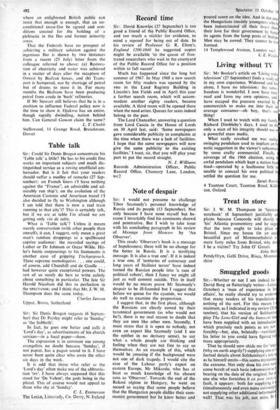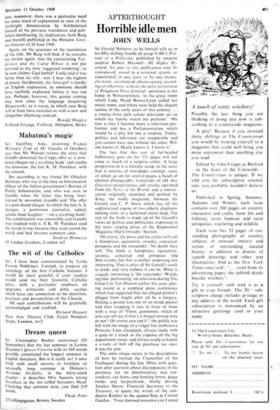Smuggled goods
Sir,—Whether or not I am indeed (as David Burg so flatteringly writes—Lette October) a 'man of experience in affairs', he really should try to under that many readers of his translations nothing of the sort. For this reason I maintain, as I indicated in my review (20 tember), that his version of Solzhenits play The Love-Girl and the Innocent sh have been supplied with an introduction which precisely such points as are now forcibly—but, alas, belatedly—ventilated his letter to you could have figured r more appropriately. That he should now chide me for `angr (why on earth angrily?) supplying one or t factual details about Solzhenitsyn's text as he himself omits—this seems mysteri the extreme. Not only does his own ye come bereft of such basic information as bearing on the date of the original, but one else who furnishes it ex post facto Is fault, it appears : both for supplying it (simultaneously and even more curiously) not supplying other additional inform& well! That was his job, not mine. In case, moreover, there was a particular need for some word of explanation in view of the forthright denunciation by Solzhenitsyn himself of his previous translators and pub- lishers (embracing, by implication, both Burg and myself) published in the Moscow Liter- ary Gazelle of 26 June 1968.
Again, on the question of the translation of the title, Mr Burg will find, if he consults my review again, that the excruciating Ten- derfoot and the Camp Whore is not put forward as my own 'suggested rendering', as he now claims. God forbid! I only said it was better than his title—not, I fear, the highest of praise. Incidentally, his love-girl' is hardly an English expression, as someone should have tactfully explained before it was too late. Perhaps, however, this quaint coining may now enter the language (acquiring Biirgerrecht, as it were), in which case Burg will at least have enriched us with a new and altogether charming concept.
Ronald Hingley Fri!ford Grange, Frilford, Abingdon, Berks.











































 Previous page
Previous page